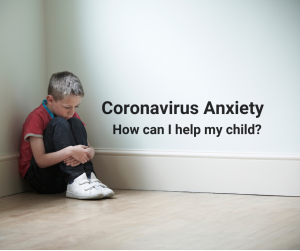Coronavirus Anxiety: How can I help my child?
It’s a very uncertain time for us all, with many of us becoming anxious about the changes being encouraged in our daily lives. For a child that has already suffered bereavement, you may find them to be additionally anxious with the media focussing so heavily on the topic of Coronavirus and potential death.
Here are some steps you can take to try to reduce their anxiety:
- Focus on what you CAN control. Write down their worries and discuss what you can do to reduce them. For example, if your child is worried that their relative may contract coronavirus or die, help them to understand what you can do as a family by following NHS guidelines. https://www.nhs.uk/conditions/coronavirus-covid-19/
Reassure that these measures aren’t forever, but just for now.
- Explain to children that there are lot of people who have recovered from Coronavirus and not everybody will die from it. Most people have a temperature and cough so will need to be treated to relieve the symptoms. It’s mostly dangerous/concerning to people who have other health problems and that’s why we need to stay away from them for now.
- If someone is not considered high risk – explain this to them and why. If they are considered high risk, what are the measures in place to look after them?
We can never promise a child that someone won’t die, but we can help them understand how LIKELY it is.
- It may reassure children to speak to their loved ones. Phone calls and video calls will not only show your child that their loved one is ok, but for those who are self –isolating it will cheer them up.
- There are lots of websites and apps which can help with mindfulness such as calm, headspace or https://www.getselfhelp.co.uk/apple.htm
- Try to avoid the phrase, ‘don’t worry about it.’ Instead, try to give accurate, age appropriate information. Of course we don’t want our children to worry, but the clearer their understanding is, the less they will need to worry. What they don’t understand, they will look up on the Internet or their imagination will create.
- Try not to show panic or fear in front of children. They will pick up on the feelings of those they trust most.
- Ensure they are only taking on news from respectable sources. Explain that the media usually only focusses on negative things, not positive. Can you make a list of 5 good things that have happened in the last week?
- Discuss normal every day and positive things, especially before bedtime. Perhaps read a book so they go to sleep thinking of positive things.
- Where possible, try to stick to routine as this can help children feel safe.
- We are being encouraged to social distance for all of the right reasons, but can you have a little fun with it?! Ask your children what they would like to do and try some new ideas. Arts and crafts, films, playing in the garden etc.
- Above all, do nice things for yourselves and for others. This is a very challenging time for us all, but it can also be a learning experience. A chance for your children to learn how we can all come together to help each other in a time of need.

